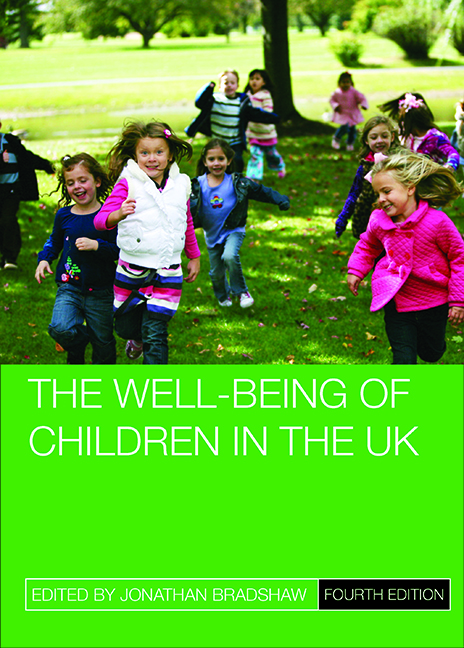Book contents
- Frontmatter
- Contents
- List of figures and tables
- List of abbreviations
- Notes on contributors
- Acknowledgements
- One Introduction
- Two Demography of childhood
- Three Child poverty and deprivation
- Four Physical health
- Five Subjective well-being and mental health
- Six Education
- Seven Housing and the environment for children
- Eight Children’s time and space
- Nine Children and young people in care and leaving care
- Ten Child maltreatment
- Eleven Childcare and early years
- Twelve Children, crime and correction
- Thirteen Conclusion
- Bibliography
- Index
Eight - Children’s time and space
Published online by Cambridge University Press: 01 September 2022
- Frontmatter
- Contents
- List of figures and tables
- List of abbreviations
- Notes on contributors
- Acknowledgements
- One Introduction
- Two Demography of childhood
- Three Child poverty and deprivation
- Four Physical health
- Five Subjective well-being and mental health
- Six Education
- Seven Housing and the environment for children
- Eight Children’s time and space
- Nine Children and young people in care and leaving care
- Ten Child maltreatment
- Eleven Childcare and early years
- Twelve Children, crime and correction
- Thirteen Conclusion
- Bibliography
- Index
Summary
Key statistics
• A total of 3.2% of dependent children who were usually resident in England and Wales had a parental second address; 40% of them have their second parental address outside of their usual area of residence.
• Ninety-seven per cent of households with children in Great Britain have internet connection.
• One in 14 school children aged between 10 and 12 in England disagrees that there are enough places to play or have a good time in their area; as many as one in eight shows low satisfaction with their local outdoor spaces.
• In European Union (EU) countries, teenage children who go online are mainly engaged in social networking, watching online videos and online gaming.
• Four in 10 children aged 5-15 own a smartphone, and nearly one in four use their mobile phone to go online.
• One in six children aged 12-15 have had experience of potentially risky online behaviours in the past year.
• Young people from poorer backgrounds are more likely to have negative online experiences compared to their more affluent peers.
• Six per cent of young people aged 10-17 in England show a low level of satisfaction with their time use.
• The majority of children said that they watch TV/listen to music on a daily basis, while only about half participate in physical activities on a daily basis.
• Girls’ employment is negatively associated with their school grades.
• The 2011 Census indicates that there were over 166,000 young carers in England. However, other research shows that the figure could be over four times this official figure.
• Young carers spend on average 15 hours per week caring for someone.
Key trends
• Children are spending less time outdoors – only 21% of children today have played in the street or neighbourhood areas every day compared to 71% of adults when they were children.
• Children are going online more, at younger ages, and in more diverse ways.
• The proportion of children using personal computers and/or laptops for accessing the internet has decreased while more children use their mobile phone/tablets for online activities.
• Children's awareness of the security risks posed by the internet underwent a decline between 2011 and 2014.
- Type
- Chapter
- Information
- The well-being of children in the UK (4th edition) , pp. 209 - 230Publisher: Bristol University PressPrint publication year: 2011

